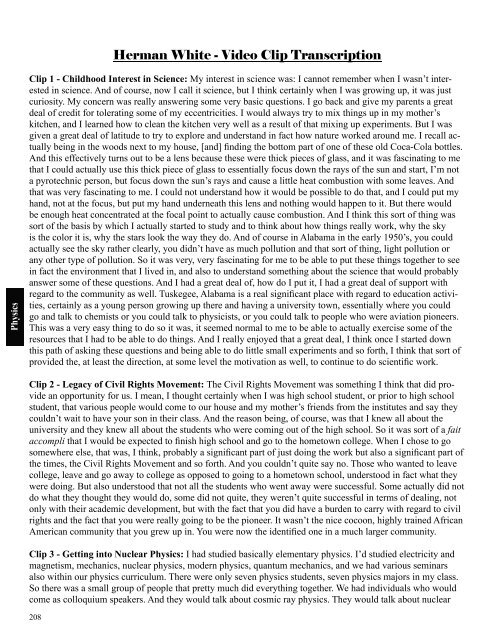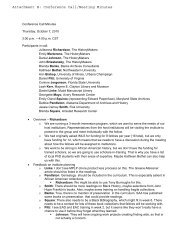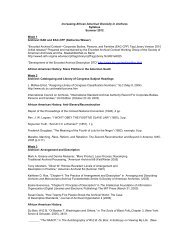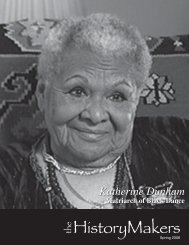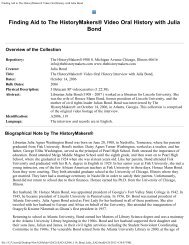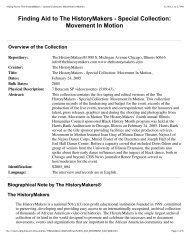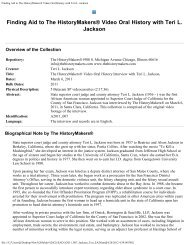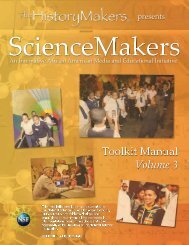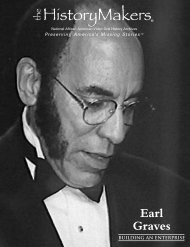ScienceMakers Toolkit Manual - The History Makers
ScienceMakers Toolkit Manual - The History Makers
ScienceMakers Toolkit Manual - The History Makers
Create successful ePaper yourself
Turn your PDF publications into a flip-book with our unique Google optimized e-Paper software.
Physics<br />
208<br />
Herman White - Video Clip Transcription<br />
Clip 1 - Childhood Interest in Science: My interest in science was: I cannot remember when I wasn’t interested<br />
in science. And of course, now I call it science, but I think certainly when I was growing up, it was just<br />
curiosity. My concern was really answering some very basic questions. I go back and give my parents a great<br />
deal of credit for tolerating some of my eccentricities. I would always try to mix things up in my mother’s<br />
kitchen, and I learned how to clean the kitchen very well as a result of that mixing up experiments. But I was<br />
given a great deal of latitude to try to explore and understand in fact how nature worked around me. I recall actually<br />
being in the woods next to my house, [and] fi nding the bottom part of one of these old Coca-Cola bottles.<br />
And this effectively turns out to be a lens because these were thick pieces of glass, and it was fascinating to me<br />
that I could actually use this thick piece of glass to essentially focus down the rays of the sun and start, I’m not<br />
a pyrotechnic person, but focus down the sun’s rays and cause a little heat combustion with some leaves. And<br />
that was very fascinating to me. I could not understand how it would be possible to do that, and I could put my<br />
hand, not at the focus, but put my hand underneath this lens and nothing would happen to it. But there would<br />
be enough heat concentrated at the focal point to actually cause combustion. And I think this sort of thing was<br />
sort of the basis by which I actually started to study and to think about how things really work, why the sky<br />
is the color it is, why the stars look the way they do. And of course in Alabama in the early 1950’s, you could<br />
actually see the sky rather clearly, you didn’t have as much pollution and that sort of thing, light pollution or<br />
any other type of pollution. So it was very, very fascinating for me to be able to put these things together to see<br />
in fact the environment that I lived in, and also to understand something about the science that would probably<br />
answer some of these questions. And I had a great deal of, how do I put it, I had a great deal of support with<br />
regard to the community as well. Tuskegee, Alabama is a real signifi cant place with regard to education activities,<br />
certainly as a young person growing up there and having a university town, essentially where you could<br />
go and talk to chemists or you could talk to physicists, or you could talk to people who were aviation pioneers.<br />
This was a very easy thing to do so it was, it seemed normal to me to be able to actually exercise some of the<br />
resources that I had to be able to do things. And I really enjoyed that a great deal, I think once I started down<br />
this path of asking these questions and being able to do little small experiments and so forth, I think that sort of<br />
provided the, at least the direction, at some level the motivation as well, to continue to do scientifi c work.<br />
Clip 2 - Legacy of Civil Rights Movement: <strong>The</strong> Civil Rights Movement was something I think that did provide<br />
an opportunity for us. I mean, I thought certainly when I was high school student, or prior to high school<br />
student, that various people would come to our house and my mother’s friends from the institutes and say they<br />
couldn’t wait to have your son in their class. And the reason being, of course, was that I knew all about the<br />
university and they knew all about the students who were coming out of the high school. So it was sort of a fait<br />
accompli that I would be expected to fi nish high school and go to the hometown college. When I chose to go<br />
somewhere else, that was, I think, probably a signifi cant part of just doing the work but also a signifi cant part of<br />
the times, the Civil Rights Movement and so forth. And you couldn’t quite say no. Those who wanted to leave<br />
college, leave and go away to college as opposed to going to a hometown school, understood in fact what they<br />
were doing. But also understood that not all the students who went away were successful. Some actually did not<br />
do what they thought they would do, some did not quite, they weren’t quite successful in terms of dealing, not<br />
only with their academic development, but with the fact that you did have a burden to carry with regard to civil<br />
rights and the fact that you were really going to be the pioneer. It wasn’t the nice cocoon, highly trained African<br />
American community that you grew up in. You were now the identifi ed one in a much larger community.<br />
Clip 3 - Getting into Nuclear Physics: I had studied basically elementary physics. I’d studied electricity and<br />
magnetism, mechanics, nuclear physics, modern physics, quantum mechanics, and we had various seminars<br />
also within our physics curriculum. <strong>The</strong>re were only seven physics students, seven physics majors in my class.<br />
So there was a small group of people that pretty much did everything together. We had individuals who would<br />
come as colloquium speakers. And they would talk about cosmic ray physics. <strong>The</strong>y would talk about nuclear


